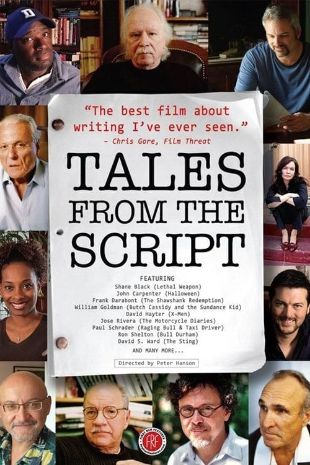You probably know this old joke: Did you hear about the stupid young Hollywood starlet? She slept with the screenwriter. That pretty much sums up both the appeal and the limitations of Tales from the Script.
The filmmakers sat down with over 50 scribes who share humorous, scary, and inspiring stories about the business. The continuing series of talking-head shots are occasionally interrupted by scenes from some of the great movies about Hollywood screenwriters including Barton Fink and In a Lonely Place.
Highlight moments include members of the old guard -- John Carpenter, Paul Schrader, and William Goldman -- talking about the battles they fought as young talents, with Schrader sharing a particularly funny anecdote about trying to get work from Don Simpson and Jerry Bruckheimer when they were the hottest producers in town. And newcomer Justin Zackham offers up the "dreams do come true" tale of how he lucked into getting his first produced script, The Bucket List, made by the director of his choice and with the lead actor of his choice.
However, the most interesting person in the movie is Guinevere Turner, who broke into the business with the independent film Go Fish. For a movie full of horror stories about egotistical actors, clueless studio suits, and power-mad directors, she's the only one who actually names names. Her tale of working with the infamously confrontational Uwe Boll on the flop BloodRayne is refreshing for both its candor and its hilarity; it's easily the best thing about the documentary because the specifics make the stories fresh.
While it's easy to enjoy Tales from the Script if you have an interest in screenwriters, people who follow Hollywood have heard these tales of woe forever and ever. Not only does it fail to tell us anything new about their role in the system, none of the interviewees offer up any nuts-and-bolts advice on how to write. You won't learn how to create fresh dialogue, or figure out story-structure problems after seeing the film, but you will be very wary of ever working with Uwe Boll. In that regard, Tales from the Script achieves its exceedingly modest goals with ease.
